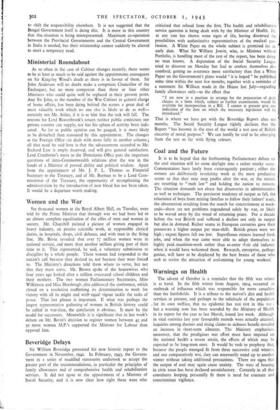Coal and the Future
It is to be hoped that the forthcoming Parliamentary debate on the coal situation will let some daylight into a rather murky scene Commentators have lately been extravagantly partisan; either the owners are deliberately restricting work at the most productive seams so that they may reap profits after the war, or the miners are resorting to "mob law" and holding the nation to ransom. The situation demands not abuse but discoveries in administration as well as technique. The persistent tendency of output CO fall, the reluctance of boys from mining families to follow their fathers' trade, the absenteeism resulting from the search for entertainment at week- ends—these are not problems engendered solely by war, or likely to be waved away by the wand of returning peace. For a decade before the war British coal suffered a decline not only in output but also in demand. Richer seams in European countries gave their possessors a higher output per man-shift. British prices were too high ; export figures fell too low. Superfluous miners learned fresh jobs, and when the war came were able to adapt themselves to highly paid. munition-workrather than re-enter their old industry when it would have welcomed them. Research, enterprise, perhaps genius, will have to be displayed by the best brains of those who seek to revive the attraction of coal-mining for young workers'.


























 Previous page
Previous page